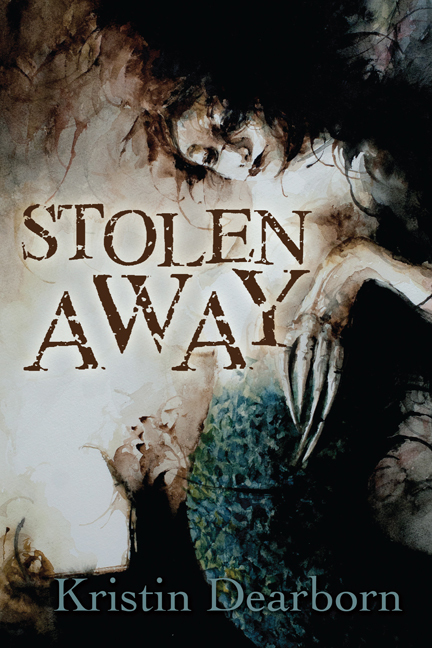Posted on Jul 12, 2016 by
Nick
I’m thrilled to welcome my friend Kristin Dearborn back to The Scariest Part this week with her new novel, Stolen Away. Here’s the publisher’s description:
Trisha will admit she’s made a few mistakes in her life but that checkered past is behind her. She loves her kids, even if it’s tough being a single mom. But her loyalties are put to the test when her infant son disappears in the middle of the night, and his big sister says a monster took him.
Now Trisha has to face the full truth behind the one-night-stand that produced Brayden in all its scaly torridness — Brayden’s father wasn’t human and isn’t interested in sharing custody. However, even though DEMON has pulled this stunt many times before, he made a mistake when he chose Trisha. The one thing she won’t do is give up her son without a fight. Along with her ex-boyfriend, Joel, Trisha is dragged back into the seedy underworld in a desperate fight to reclaim her son, only this time she’s got a lot more to lose.
And now, let’s hear what the scariest part was for Kristin Dearborn:
I am not a mother, so I wonder if I’m even qualified to speak on the topic. I am a woman who lives in a culture where motherhood is valued above all else, and who has observed the cultural experiences of many mothers. For me, the scariest part of Stolen Away is the intersection of motherhood and one’s identity as a woman. And the demons.
Another light, fluffy post from Kristin Dearborn.
Let’s look at some of the premier examples of demon fiction over the past few decades. William Peter Blatty’s The Exorcist. Ira Levin’s Rosemary’s Baby. Paul Tremblay’s Head Full of Ghosts. There are going to be spoilers here, so if you haven’t read them, maybe stop now.
How often do demons target men? I feel like there must be some manly demon possession stories, but I can’t think of any off the top of my head. Most often, we read about and watch beautiful women reduced to something monstrous by a demonic invader. The trope relies on women being virginal and innocent (à la Regan in The Exorcist.). Also, lest we forget, women have the whole original sin thing hanging over their heads. Tremblay plays with all of these tropes in Head Full of Ghosts though in his case, there’s no demon there, just a mentally ill girl. His book works because we’re all so conditioned through decades of this trope that the family in the book and the viewers of the show within a book, The Possession. Movies more than books are guilty of this sin, I can name a dozen mediocre horror flicks where teen girls are cursing, over-sexed McGuffins while the manly men fight to bring them back to their virtuous states.
Motherhood in horror is another place where women get the short end of the stick. From evil mommy tropes (think Carrie), to body horror (Cronenberg’s The Brood) mothers have it rough in the genre. The mother in horror is either a demonic entity controlling the players, or someone without identity, existing only to keep her children alive (and sometimes both!). The titular character in Rosemary’s Baby highlights this: she is a brilliantly rendered character who struggles to come to terms with the changes of her body during her pregnancy, with the changes in her relationship with her husband, and the cult of Satan worshippers who have her primed as their vessel.
Trisha Callahan is a recovering addict. She never knew her father and her mother died when she was younger. She’s got two kids from two different guys, but never really got a chance to grow up herself. When a woman becomes a mother — becomes pregnant, even — everyone suddenly feels like they have the ability to weigh in. Wait periods on abortion. Unhelpful counseling. Uninvited touches in the supermarket. Questions. Once the baby is born, there are judgements on breastfeeding and how early they talk and what kind of food they eat (better be organic and growth hormone free) and do you read to them? How much screen time do they get? In some ways, every woman is Rosemary Woodhouse as the cult grooms her to be a host for their baby.
DEMON takes away Trisha’s choice when he drugs her and rapes her. There’s a moment early on in the book where Trisha is terrified the media will make another Casey Anthony out of her when her son goes missing. The scrutiny of women is bad enough without demon possession.
I tip my hat to all the moms out there, especially the ones who’ve had to raise kiddos on their own. Hopefully Trisha’s story rings true to at least some of you, less the demon bits and more the womanhood pieces.
Kristin Dearborn: Website / Twitter / Facebook
Stolen Away: Amazon / Barnes & Noble / Powell’s / IndieBound / Raw Dog Screaming Press
If it screams, squelches, or bleeds, Kristin Dearborn has probably written about it. Kristin has written books such as Sacrifice Island (DarkFuse) and Trinity (DarkFuse), and had fiction published in several magazines and anthologies. Stolen Away was recently a limited edition offered from Thunderstorm Books, which sold out. She revels in comments like, “But you look so normal…how do you come up with that stuff?” A life-long New Englander, she aspires to the footsteps of the local masters, Messrs. King and Lovecraft. When not writing or rotting her brain with cheesy horror flicks (preferably creature features!) she can be found scaling rock cliffs or zipping around Vermont on a motorcycle, or gallivanting around the globe. Kristin’s latest DarkFuse release is Woman in White.
 Disappearance at Devil’s Rock by Paul Tremblay
Disappearance at Devil’s Rock by Paul Tremblay

